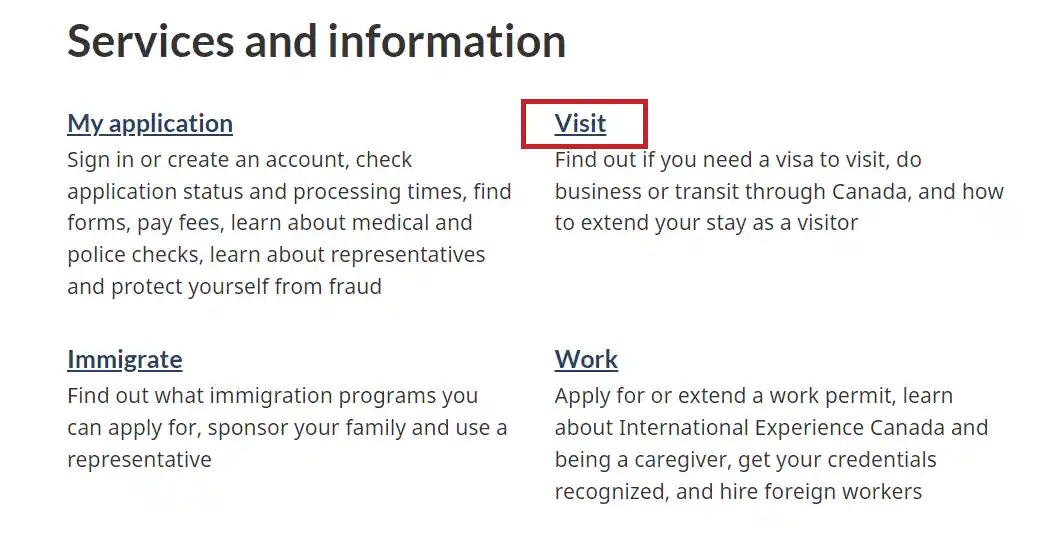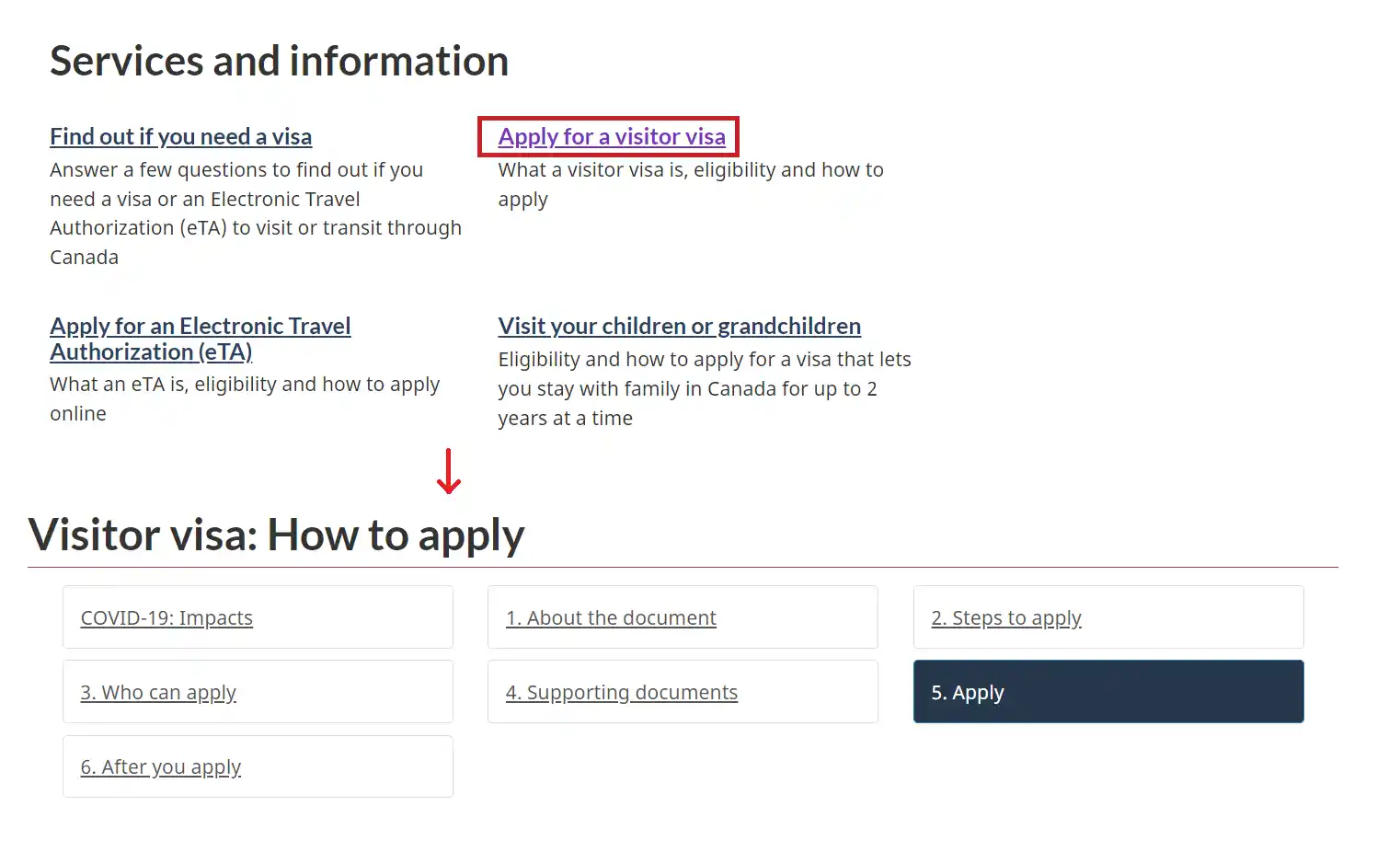Canadian tourist visa
Conditions, documents and fees for obtaining a Canadian tourist visa
A visitor visa, also called a temporary resident visa (Temporary Resident Visa – TRV) is an official document that the Canadian immigration officer inserts in your passport as a tourist visa applicant. This official document shows that you are eligible to enter Canada.
- Cost of application + fingerprinting: $185
- Validity period: 5 years
- Duration of stay: 6 months per entry
- Required financial resources: 12 thousand dollars per person (6 months stay)
Types of Canadian tourist visas
Canadian tourist visas are issued in two ways: Single visa or one time entry and multiple visa or multiple entries.
Also, with the Canadian Super Visa, which is a multiple entry visa, parents of Canadian citizens and permanent residents can travel to Canada.
Single visa
One time entry permit for 6 months
With a single Canada visa, you are allowed to enter this country only once. For example, a single visa is issued for the official visit of officials of this country, participation in a conference or participation in a special event in this country. After leaving Canada, if you intend to travel to this country again, you need to apply for a new visa again.
Multi visa
5-year Canadian visa with multiple entries
A Canadian multi-entry visa may be issued for a period of 5 years, 10 years, or as little as one month before the passport’s expiration date. You are allowed to enter Canada repeatedly as long as the validity of the Canadian multiple visa, which is usually 5 years for Iranians, and you are allowed to stay in Canada for up to 6 months with each entry.
Super Visa
Canadian tourist visa for parents
Canadian super visa It is a multiple entry visa that is valid for up to 10 years and allows parents/grandparents of Canadian citizens and permanent residents to stay in Canada for 5 years each time they enter Canada without having to renew their status. Stay there and live with your children and grandchildren.
Conditions and documents required for Canadian tourist visa
To apply for a Canadian tourist visa, you must have the following conditions and documents:
general documents; Identity, lack of bad background and fingerprinting
- Personal documents such as a valid passport, translation of birth certificate, translation of marriage certificate (if any), translation of educational certificates, translation of the end of service card (if any)
- Translation of the certificate of no bad background
- Fingerprinting in one of the VAC centers of the Canadian Embassy in Iran’s neighboring countries
- Filled tourist visa forms
Travel records and purpose of travel letter
- Providing travel history through the stamps inserted in the passport
- Letter of purpose of travel explaining the detailed plan of visiting Canada
Financial capability and account turnover for the last 6 months
One of the important things that you should pay attention to is providing sufficient financial resources for the duration of your stay in this country. There is no minimum financial requirement for a Canadian tourist visa. In fact, depending on how many months you plan to stay in this country and whether you will stay with your relatives and friends or stay in a hotel, the amount of financial resources is different.
For example, if you are going to spend your entire 6 months in Canada with your relatives, you need to provide at least 2,000 Canadian dollars per month, so you need at least 12,000 dollars for the duration of 6 months. Of course, this amount is an average and it is recommended for Iranians to provide more financial resources. This amount can also be provided by your inviter.
In addition, you need to consider an amount for your medical insurance in Canada. If you get medical insurance from private companies, it costs $5 per day. So, for example, if you stay in Canada for 3 months (90 days), the cost will be $450 in total.
Required documents for tourist visa with invitation letter
- Documents related to the inviting person, such as citizenship or permanent residence card, or university registration letter, professor permit and student visa, or employment letter and work visa. Also, any document that shows the stability of the inviting person’s economic situation in Canada, such as property documents, pay slips, tax payment slips, etc. In addition, it is not necessary for the inviter to provide a bank statement, but in order to show that the inviter is in good financial condition and has the ability to host you, we recommend that you get a bank statement from them and add it to the documents.
To apply for a Canadian tourist visa, you need to have an invitation from someone in Canada. This person can be your first degree relative, friend or relative. Writing an invitation does not mean that the person inviting you is legally responsible for you, but it shows that she/he is your host and will cover your financial expenses in Canada if needed.
In the invitation, it is necessary to write both your profile and the profile of the inviter. In the following, we will explain this information separately.
Details of the inviter
- full name
- Date of birth
- Address and phone number in Canada
- Current status in Canada (citizen, permanent resident, student, etc.)
- Job title (if employed)
Details of the invited person
- full name
- Date of birth
- Address and phone number of the country of origin
- The ratio of the person to the inviting person
- The purpose of the trip
- Duration of stay in Canada
- Information about accommodation in Canada and how to pay for it
- Date of departure from Canada
The Canadian Immigration Department may ask you to have the invitation letter approved by official offices in Canada or notarized. In this case, ask your inviter to send you a letter with an official seal and notarized.
tourist visa without invitation; Hotel receipt and travel details
It is not necessary to submit an invitation letter for a Canadian tourist visa, and you can apply for this visa with documents related to hotel reservations and round-trip plane tickets, but not having an invitation letter reduces the chances of a visa and puts your case at great risk, unless it is for the purpose Pay more for your trip and describe your itinerary very accurately and in detail.
For example, in the description of your daily schedule, write where you plan to go, what place or exhibition to visit every day. If you are registered with Canadian tourism tours, provide the relevant documents and write the tour itinerary completely from the first day to the last.
Employment documents and financial documents
- Employment documents such as employment letter, employment contract, retirement order, last 6 months salary slips, insurance records and work leave certificate (if possible). If you have a company and business in your country, provide company documents such as official gazette, company statutes, tax payment list, employee salary payment list or acquisition certificate.
- Documents related to your assets such as house, apartment, land, shop etc
Procedures and costs of obtaining a visitor visa

Preparation of documents before application
Passport renewal and official translation of identity and financial documents
Preparation of financial documents
Receiving the invitation and completing the required forms
Hotel reservation and plane ticket purchase

Completing the form, sending the documents and paying the fees
1. Completion of temporary residence forms, family information and Skjal One
- First, enter the website of the Canadian Immigration Department and select the English language.
- On the opened page, select the Visit option.

- After selecting Visit, on the opened page, select Apply for a visitor visa and then Apply.

- At the bottom of the Apply page, answer the specified questions and specify the purpose of your tourist trip.
If you intend to visit your family members and relatives, select the first option (To unite a family member) and then do the next steps.
- Create an account through IRCC Portal and answer application questions.
- Download the generated forms, then fill and sign them.
- Upload the necessary documents and the filled forms in the requested section in the application.
2. Visa and fingerprint payment
Pay the tourist visa fee and the fingerprinting fee.
3. Receive biometric appointment from the Canadian Embassy
Make a biometric appointment at one of the VAC offices of the Canadian Embassy in Iran’s neighboring countries and take your fingerprints at the specified time.
4. Canadian visa pickup after approval
Congratulations, you got your visa! Now, to insert the visa label, pick up your passport at the Canadian embassy in one of Iran’s neighboring countries.
Canadian tourist visa fee
To apply for this visa, you need to consider several costs, such as the cost of reviewing the application at the Canadian Immigration Office, the cost of biometrics or fingerprinting, and providing sufficient financial resources for the duration of your stay in Canada. Also, in this section, we also examine the details of tourist travel expenses to Canada.
| Cost description | each person | Family |
|---|---|---|
| Official translation of documents | 500,000 to 1,000,000 tomans | — |
| Examination of the case by the embassy | $100 | 500 dollars (family of 5 or more) |
| Immigration lawyer (optional) | 500 to 600 dollars | — |
| Fingerprint | $85 | $170 (family of 2 or more) |
| 3-day trip to Türkiye for fingerprinting | 15 to 20 million tomans | — |
| Visa pickup | Starting from 1,000,000 Tomans | — |
| Round trip ticket to Vancouver | $2,800 to $3,500 | — |
| Address | $1,500 to $4,000 per month | — |
| Insurance | $5 per day – $150 per month | — |
| entertainment | 500 dollars per month | _ |
| Public transportation | 100 to 150 dollars per month | _ |
| clothes (pants or t-shirt) | 30 to 50 dollars | _ |
| Souvenir buying | 10 to 20 dollars | _ |
| Meals (one meal + coffee) | $15 + $5 | _ |
| Extension of stay as a visitor | $100 | _ |
Reasons for tourist visa rejection and re-application procedures
Canadian tourist visa may be rejected for various reasons, some of the most important reasons are listed below:
- Unclear purpose of traveling to Canada
- Insufficient property and assets in the country of origin
- Providing insufficient or incomplete and ambiguous documents
- Unstable job status of the applicant in the country of origin
- Disproportion between the length of stay in Canada and the amount of financial resources provided
- No travel history
- Failure to provide sufficient documents from the inviter
- Lack of sufficient financial ability of the inviting person
- Lack of physical health
- Having a bad background
- The officer is not satisfied with the return of the applicant to her/him country
If your tourist visa application is rejected for the reasons mentioned above, it is possible to re-apply to the Canadian Immigration Department. But it is useful and fruitful when you solve the problems of your case according to the officer’s comments and try your luck again. Otherwise, if you do not change your conditions and documents and do not fix the problems in the case, your application will be rejected again.
Conversion and extension of Canadian tourist visa
It is possible to convert a Canadian tourist visa to other visas such as work, study or permanent residence visas, but before doing so, think about your long-term plan. Think in advance about the next step after entering Canada and take it seriously because you may resign from your job in your country or you may sell your property and enter this country with the hope of staying in Canada, and therefore in If you do not succeed in Canada, it will be difficult for you to return to your country.
Converting a tourist visa to a business one
If your goal is to change from a tourist visa to a Canadian work visa, research in advance how to find a job and get a job offer from Canadian employers. Assess your conditions for getting a job and see if you have enough skills and work experience to get a job in this country or not.
Converting a tourist visa to a study visa
If you intend to change it to a Canadian study visa after obtaining a tourist visa in Canada, research your requirements for admission to Canadian universities in advance and see if you also have the necessary conditions to obtain a study visa.
Immigration through tourist visa
It is not possible to directly change a tourist visa to a permanent residence in Canada, but you must first obtain a Canadian study visa or a work visa through one of the study or work methods, and after obtaining the necessary conditions, apply for a permanent residence in Canada.
You may be in a special situation that requires you to stay in Canada for more than 6 months, in which case you must apply for the extension of your visitor visa from within Canada at least one month before the end of your 6-month stay period. The record is called Visitor Record.
Obtaining a Canadian tourist visa for family members
Canadian tourist visa for spouse
If you are in Canada with a temporary stay and you intend to get a Canadian tourist visa for your spouse, you can apply through the accompanying tourist visa (TRV).
You are working in Canada
If you are in Canada with a temporary stay and you intend to get a Canadian tourist visa for your spouse, you can apply through the accompanying tourist visa (TRV).
You are studying in Canada
If you have a master’s permit and study in one of the institutions that have DLI, you can apply for a tourist visa for your spouse by showing your student visa confirmation. Of course, be careful that if you are a student, your spouse will receive a visitor record, and with the status of a visitor, she/he is not allowed to work or study in Canada.
Converting a tourist visa to an open work permit for a spouse
If your spouse plans to work in Canada, she can change her/him status from visitor status after entering Canada. In this way, she can apply for an open work permit and if she is eligible, she/he will receive the open work permit.
In order to be able to get a Canadian companion visa for your spouse, you must be able to prove that you have enough financial resources to cover your own living expenses in Canada as well as your spouse’s expenses. Your spouse must also show that they will leave Canada with you after your work permit or study permit expires.
You can find more information on this subject by reading the accompanying Canada visa article.
Canadian tourist visa for siblings
It is possible to get a Canadian tourist visa for your brother and sister by issuing an invitation, but the chance of getting a visa is not 100%. First-class members like brothers and sisters have more chances than other members. Finally, it is the officer who determines whether they can get a visa or not.
Using your invitation letter, your siblings can prepare a stronger case to present to the immigration office. In fact, your presence in Canada is considered a positive point for them and increases their chances of getting a visa because their purpose of travel is more specific.
If your siblings have no history of traveling to Schengen, the officer may reject their visa application for the same reason, which of course can be easily defended in court. Not having a history of traveling to the Schengen zone cannot be the reason for denying your sibling from visiting you. Of course, the existence of such a record in their travel history can add more weight to their case.
Canadian tourist visa for parents
If you are studying in Canada (or your child is studying in Canada), it is possible to invite parents to Canada using a Canada invitation letter issued by a university, college or school. This invitation makes the process of getting a tourist visa easier for parents, but it does not guarantee that they will get a visa.
Getting a Canadian tourist visa for parents can be done by applying for a Canadian Super Visa. Canadian super visa is a multiple-entry visa issued to parents. The Canadian Supervisa allows multiple entries to Canada and is valid for 10 years. With each entry through this visa, you can stay in Canada for up to 5 years without renewing your status.
You can learn more about this by reading the Canada Super Visa article.
Canada tourist visa for child
If you have a legal status in Canada, i.e. you are allowed to study through a master’s permit or you are allowed to work through a work permit, you can get a Canadian tourist visa for your child and take her/him to Canada with you. She/he can also study or work by entering Canada under certain conditions.
Working or studying conditions of children under tourist visa:
Child under 18 years old
If your child is under the age of 18 after arriving in Canada, they can study in preschool, elementary school, or high school without a teacher’s permit.
It is interesting to know that most public schools in Canada provide free education for children who come to Canada under such conditions. That means you don’t need to pay tuition.
If your child is under the legal age, that means she is in school and cannot work while studying. For non-Canadians, the child must be at least 18 years old to get a Canadian work permit.
Children over 18 years old
If your child is over 18 years old, she/he must apply for a teacher’s permit to study in Canada and cannot study without a permit. Of course, in this case, it is not necessary to apply for a teaching permit from within your own country, and you can also apply for a teaching permit from within Canada.
College and university tuition for children of dependent age (between 18 and 22 years old) is calculated locally, which is 3 to 8 times cheaper than international student tuition, depending on your province of residence.
If your child wants to work after entering Canada and they are 22 years old or older (over the age of dependency), they are no longer considered dependent on you and must apply for a work permit separately.


No comment